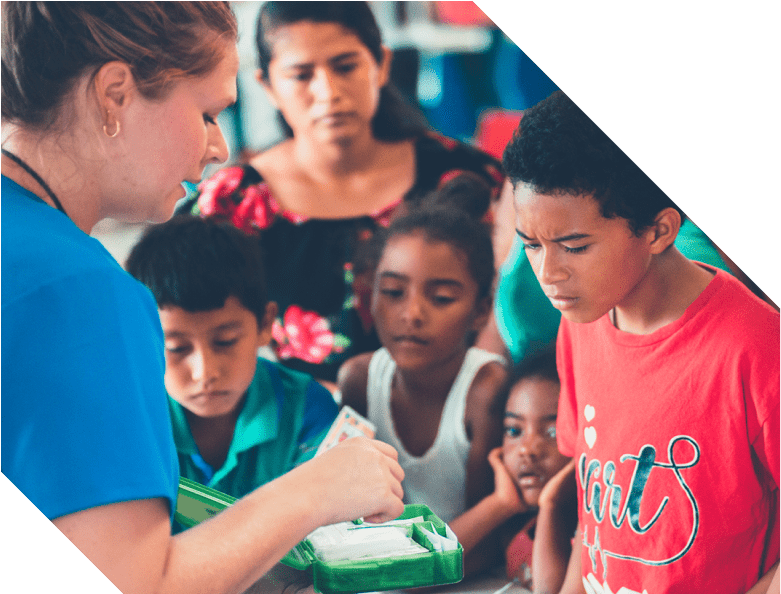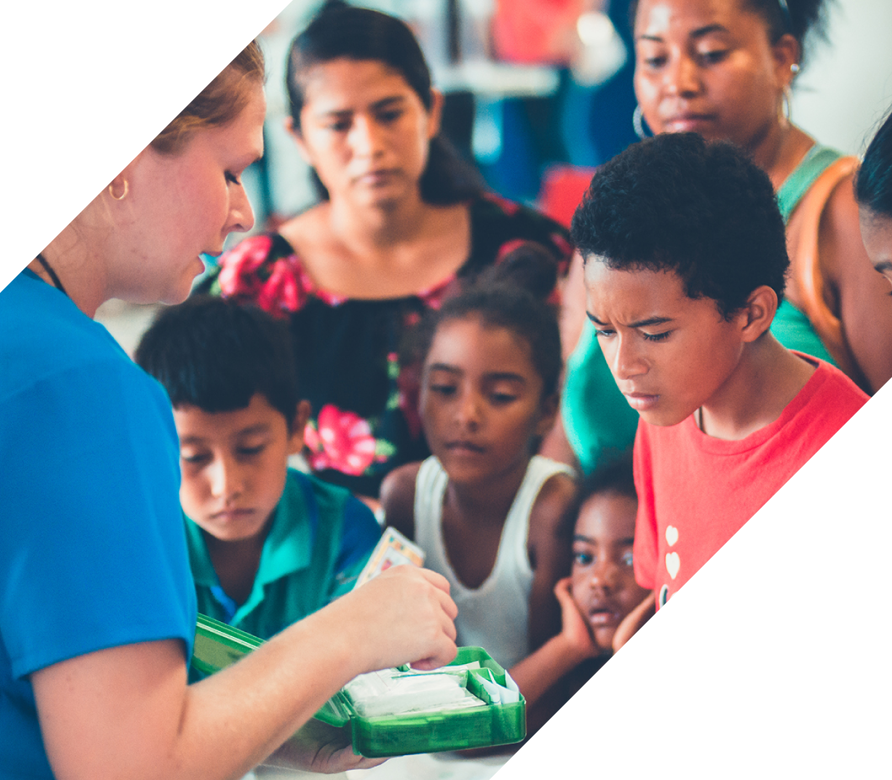
Making healthcare run better, everywhere we go
We understand that much of the world lives in a clinical desert, unable to access even the most basic care. Partnering with nonprofit organizations and health facilities all over the world, we create solutions that empower communities and free up the resources that healthcare providers need to deliver their best care.
To advance this effort, we began 2020 with a surgical trip to Tegucigalpa, Honduras. But as the reality of COVID-19 became clear, we changed tactics and shifted priorities. Worldwide supply shortages meant learning to operate with finite resources. And though the distance seemed greater than ever, we found ways to close it—providing remote support and developing online education opportunities to help ensure our commitment to global health equity continues.
We focus on three key areas
We’re helping healthcare facilities work more efficiently, treat more patients and share the benefits of health education.
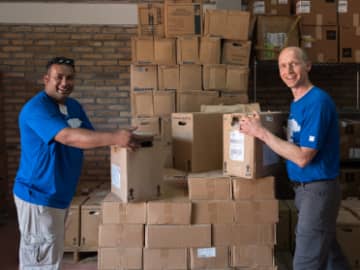
Supply chain optimization
We analyze supply chain performance, identifying bottlenecks, process breakdowns and opportunities to improve. We then introduce new processes to help control costs, effectively manage donations, reduce inventory waste and optimize performance.
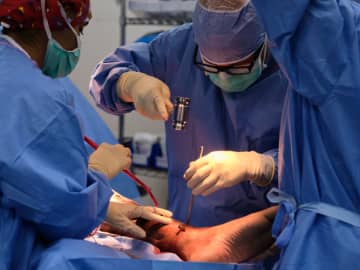
Perioperative efficiency
We identify the processes healthcare facilities use to manage their operating rooms, and pinpoint challenges within these processes. Then, we work together to create and implement new efficiencies, from stocking inventory to organizing supplies and storage areas. These improvements support perioperative efficiencies for the long haul.
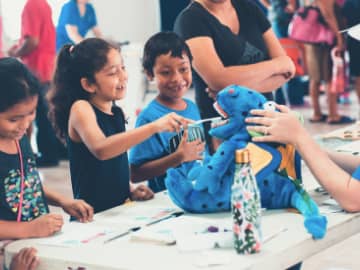
Health education
We assess a community’s health education to find gaps in learning. We then fill in these gaps by teaching everyday healthy habits such as hand hygiene, oral hygiene and basic first aid. Reinforcing—and practicing—these habits creates a ripple effect, advancing the health and well-being of whole communities.
Our global impact at a glance
Together with our international partners, here’s what we accomplished in 2020:
Bringing worldwide medical relief
We work with international aid organizations to collect Medline surplus and unused items and deliver them to developing regions globally. In 2020, Medline donated the equivalent of 513 metric tons of product—valued at more than $4.66 million, a 342% increase over the previous year. Our partners include:
- Project C.U.R.E.
- Direct Relief
- Medical Teams International
- Giving Children Hope
- MedShare
- MAP International
- Matthew 25 Ministries
- Christian Aid Ministries
- CURE International
Our products reached 191 facilities, caring for people across 62 different countries.
Making sure everyone gets the healthcare they deserve
Along with donating products, our employees volunteer their time and expertise to help facilities and communities in need. Through our global health projects, our employees lend their skills toward building healthcare capacity in low-resource countries. In 2020, Medline employees donated 1,009 hours of their time to help further our Global Health Initiative.
Safe, affordable surgical care
One World Surgery (OWS) runs a surgery center in Honduras that provides safe and free surgical care to an underserved population. Since 2018, we’ve worked to help their center run more efficiently so that staff can focus on what matters most: patient care.
The impact of surgical intervention is unlike any other health intervention. It can cure one third of all human illness and disease and can almost immediately change a person’s life. In chronically underfunded health systems, surgical care is ignored and widely inaccessible to the poor. Local facilities lack appropriate supplies and equipment. Medical professionals sometimes do not have training or experience in the latest techniques. Few can afford the high cost of surgery.
In February of 2020, a team of Medline clinical volunteers traveled to OWS Holy Family Surgery Center, where they assisted with a series of orthopedic surgeries for patients who may not have been able to afford care otherwise. 28 surgeries and 20 consults were performed.
In addition, we continued to support OWS Holy Family Surgery Center with supply chain and perioperative efficiency projects initiated in 2019 that have transformed the way purchased and donated perioperative supplies are organized, inventoried and found. Our solution enables surgery center staff to properly itemize and account for each instrument or piece of equipment, which can minimize redundancies and overages.
In 2019, we committed $250,000 to help OWS build a new surgery center in the Dominican Republic, with plans to begin surgeries in early 2022. Currently, OWS borrows space in facilities in the bateyes—nearby Haitian settlement communities—and provides primary care services to Haitian families that came to work for area sugar fields and mills. We also plan to lend the same skills and expertise that were used to transform the OWS Honduras warehouses to support OWS in the Dominican Republic and will facilitate that process remotely due to COVID-19.
Global health supply chain education
In 2020 we formed a partnership between Partners in Health and Loyola University Chicago to develop a bachelor’s degree in global health supply chain management for the University for Global Health Equity in Rwanda. 2020 was spent defining the needs and project scope; in 2021, Medline volunteers will assist with a literature review to help inform the curriculum.
Resources for patient care
Community Empowerment (CE), a nonprofit partnered with Rush University Hospital, hosts primary care and surgical trips to the Dominican Republic and Haiti.
In 2019, we partnered with CE to help them organize supplies and optimize space within their warehouses in the Dominican Republic. Our team helped CE track their inventory more efficiently so they can spend less time managing supplies and more time focusing on patient care. The solution saves the organization time and money when it comes to ordering and managing their supplies—opening up resources they can put toward patient care. We continue to support the organization with supply chain optimization work virtually and will assist CE with the optimization of their Chicago warehouse in 2021.
Clinical training
Building upon an in-person wound care education series in Argentina, Medline volunteers created an online series of chronic-wound care courses to empower clinicians in low-resource settings.
Available free of charge on Medline University in both English and Spanish, the course series helps clinicians around the world increase their knowledge in chronic wound care, a global health epidemic that still is not a specialty in much of the world.
Medical device donation processes
Each year, developing nations receive tons of free medical supplies donated from health systems and nonprofit organizations across the United States. Some credit donations for up to 80 percent of their supplies. The problem is—not all of it is useful. According to one estimate, around 40 percent of donated medical equipment found in low-income nations is not usable.
But in December of 2019, before the potential impact of COVID-19 was even known, Medline hosted a supply chain roundtable with a dozen industry experts to discuss challenges and possible solutions for better, more responsible donation of medical supplies to low-resource countries.
In 2021, we will kick off a pilot project in partnership with a low-to-middle-income (LMIC) country, region or cadre of hospitals. The goal is to document, refine and replicate supply chain best practices for global health settings.
Take a look at how stories are changing around the globe
NEWSROOM

How getting back to basics can better promote health
Remembering the simple innovations that play a critical role in improving health.
NEWSROOM

Addressing social determinants of health in honor of UN World Health Day
Understanding how the way health systems operate can impact health.
NEWSROOM

A model for sustainable surgical centers in low-income countries
One World Surgery, a nonprofit organization, breaks down common misconceptions around delivering surgical care globally.
